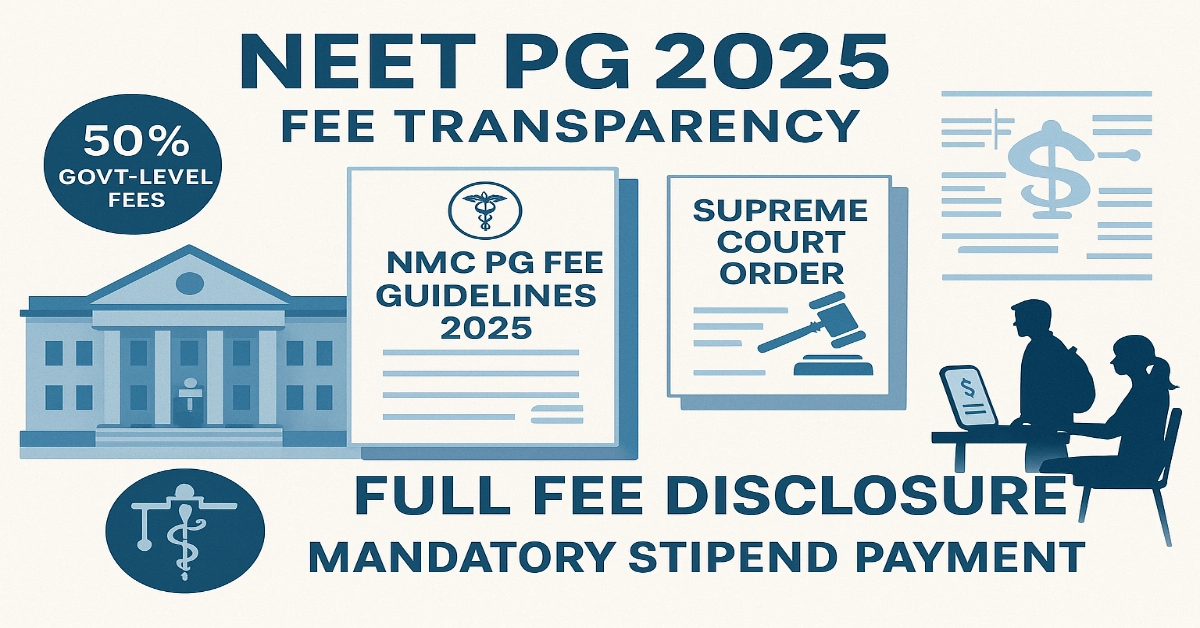NMC PG Fee Guidelines 2025: The MCC Counselling for the NEET PG 2025 has started. Apart from counselling and college selection, most NEET students are worried about fees that private medical colleges charge. It is despite that NMC Act cleary empowers NMC to set 50% seats in private colleges must be filled at government set subsidised fees.
With the National Medical Commission (NMC), the Supreme Court of India, and State Fee Regulatory Committees tightening rules around fees, stipends, and admission procedures, NEET PG 2025 aspirants need to know for better understandig their rights.
Many PG students faced:
- Hidden or inflated fees
- Lack of transparency from private colleges
- Non-payment of stipends
- Illegal internship fees
- Unregulated miscellaneous charges
To address these issues, the NMC has issued comprehensive guidelines, reinforced by a major Supreme Court judgment (April 29, 2025) and a fresh public notice dated July 11, 2025.
Why NMC Strengthened PG Fee Regulations in 2025
The need for strict regulation arose due to recurring complaints regarding undisclosed or inflated fees, lack of clarity during counselling, heavy caution deposits, and non-payment of stipends. Two major Supreme Court rulings in 2025 became catalysts for change.
The April 29, 2025 judgment in State of Uttar Pradesh & Others vs. Miss Bhavna Tiwari & Others mandated that private and deemed universities must publish complete details of tuition fees, hostel charges, caution deposits, and all miscellaneous charges before the counselling stage.
The Supreme Court also issued interim directions in Abhishek Yadav & Others vs. Army College of Medical Sciences & Others, ordering institutions to stop imposing illegal internship fees and mandating regular stipend payments to interns, Junior Residents (JRs), and Senior Residents (SRs).
These rulings created a framework that the NMC fully incorporated into its July 11, 2025 public notice.
| NEET PG Counselling Guide 2025 | |
|---|---|
| MCC NEET PG Counselling Guide eBook 2025 | 📥 Download |
| DNB Counselling Book 2025 | 📥 Download |
NMC’s Public Notice Dated July 11, 2025
The NMC issued a national directive demanding complete transparency in fee disclosure and strict adherence to stipend rules. This notice reinforces Supreme Court instructions and strengthens enforcement across all medical institutions.
Full Online Disclosure
All medical colleges must publish the entire course-wise fee structure on their official websites. This includes tuition fees, hostel charges, caution deposits, mess fees, exam fees, and every other component a student is required to pay.
Disclosure of Stipends
Institutions must publicly display the stipend amounts for interns, Junior Residents, and Senior Residents. This eliminates confusion and ensures students know what compensation they are entitled to.
Mandatory Submission Through Google Forms
The NMC provided official Google Form links for institutions to submit:
- Complete course-wise fee structures
- Stipend details for MBBS interns, JRs, and SRs
This submission must be completed within seven days of the notice.
Warning of Regulatory Action
The NMC has made it clear that any institution failing to disclose fees or stipends, or violating regulations, will face strict penalties, including suspension of admissions and withdrawal of course recognition.
Regulations Supporting the New Guidelines
The July 2025 directive is supported by existing NMC regulatory frameworks.
Fee Disclosure Under PGMER 2023
Regulation 4.3 of the Post Graduate Medical Education Regulations (PGMER), 2023, mandates that colleges must disclose fees when entering data in the seat matrix. If any fee is not disclosed, the corresponding seat will not be counted for admission.
Any collection of undisclosed or unapproved fees is considered unauthorized.
Mandatory Stipend Rules
Three key regulations define stipend requirements:
- CRMI Regulations 2021: Interns must receive stipends determined by the competent authority.
- PGMER 2000: PG trainees must receive stipends regularly.
- PGMER 2023: Residents must be paid stipends similar to government medical colleges, unless otherwise specified.
Stipend payment is therefore a legal requirement, not a discretionary choice for colleges.
Core Principles of the NMC PG Fee Guidelines for 2025
The NMC PG Fee Guidelines introduce major reforms aimed at affordability, fairness, and transparency.
Government-Level Fees for Half the Seats
All private and deemed medical colleges must charge government medical college–equivalent fees for 50% of their PG seats. This drastically reduces the financial burden on students, especially in clinical specialties like Medicine, Radiology, Pediatrics, and Orthopedics.
Transparent Fee Structures
Every college must publish:
- Tuition fees
- Hostel and mess charges
- Caution deposits
- University/exam fees
- Refund rules
- Stipend details
This removes ambiguity and prevents exploitation during or after admission.
Fair and Justifiable Fees
Fees must reflect reasonable operational costs, not arbitrary profit-making. Institutions must justify expenses based on:
- Infrastructure
- Faculty salaries
- Clinical material
- Patient load
- Academic resources
No Hidden Charges
Colleges cannot add new charges after admission. All fees must be pre-declared and approved.
What Colleges Can and Cannot Charge (NMC + Supreme Court)
Permissible Charges
| Allowed | Notes |
|---|---|
| Tuition fee | Must be approved by Fee Committee |
| Hostel fee | Optional; must be reasonable |
| Mess fee | Optional & itemized |
| Security deposit | Refundable with written policy |
| Exam/university fees | As per university norms |
| Skill lab charges | Only if pre-declared |
Prohibited Charges
| Not Allowed | Reason |
|---|---|
| Capitation fees | Illegal under SC & NMC |
| Development fees | Considered non-academic |
| Mandatory hostel | Cannot force resident |
| Internship fees | Prohibited by SC |
| Hidden charges after admission | Violates Regulation 4.3 |
| Unapproved fees | Deemed unauthorized |
| Stipend deductions | Illegal |
Mandatory Stipend Structure for Interns and Residents
The updated rules make stipend payment an enforceable obligation.
Stipends for Interns
Interns must be paid stipends as determined by the state authority or the parent university. This applies to all colleges, including private and deemed institutions.
Stipends for Junior and Senior Residents
Residents must receive regular monthly stipends comparable to government institutions. Colleges cannot reduce, delay, or deduct stipends without following due legal process.
Public Disclosure
Colleges must publish stipend amounts on their websites and submit them through official NMC forms.
Penalties for Non-Compliance
The NMC has empowered itself to take strong action against institutions that fail to comply with fee disclosure or stipend requirements. Penalties can be imposed under:
- Regulations 30 and 31 of the Establishment of Medical Institutions, Assessment and Rating Regulations, 2023
- Regulation 8 of the Maintenance of Standards of Medical Education Regulations, 2023
- Regulations 9.1 and 9.2 of Post-Graduate Medical Education Regulations 2023
Possible consequences include:
- Issuance of show-cause notice
- Monetary penalties
- Suspension of admissions
- Withdrawal of course recognition
- Downgrading of institutional ratings
- Public disclosure of violations
These measures ensure that institutions cannot disregard the guidelines without facing serious repercussions.
Comparison of Government and Private PG Fees After Regulation
Government medical colleges continue to have the lowest PG fees in India, typically ranging from ₹10,000 to ₹1 lakh per year depending on the state.
Private and deemed colleges previously charged ₹15 lakh to ₹45 lakh per year for clinical branches. After regulation, half of these seats must follow government-level fees, dramatically reducing cost barriers for students.
Deemed universities are now required to disclose every component of their fee structure and are subject to scrutiny by Fee Regulatory Committees and the NMC.
What NEET PG 2025 Aspirants Should Do
Students must carefully review college websites, verify state-fixed fees, download fee PDFs, check stipend amounts, and avoid institutions that do not disclose clear information.
During counselling, students should prioritize colleges with transparent fee structures and established stipend records. After admission, students should maintain documentation of fee disclosures and promptly report violations to NMC authorities.
The NMC PG Fee Guidelines represent a major reform in India’s medical education system. They promote transparency, reduce opportunities for exploitation, enforce fair compensation for residents, and make PG medical education significantly more accessible.
These regulations protect students, support merit-based admissions, and strengthen the overall quality and integrity of postgraduate medical training in India.

